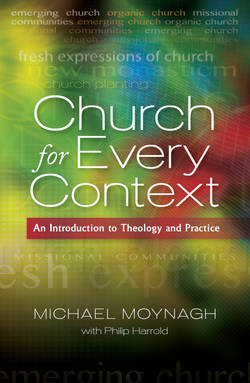Читать книгу Church for Every Context - Michael Moynagh - Страница 100
На сайте Литреса книга снята с продажи.
From a mass to a customized world
ОглавлениеThe economy is the central pillar on which the theory of the network society rests, and for Castells private firms are the main engine for the restructuring of the economy (Castells 2000a, pp. 163–215). At the heart of this restructuring is the transition from mass, ‘Fordist’ methods of production to ‘post-Fordist’ flexible production. Adopting broadly a ‘post-Fordist’ approach, Castells argues that by the 1970s established ways of organizing business were becoming less and less profitable.7
For over half a century organizations had been growing steadily more centralized and complex. This made large-scale production possible, using huge assembly lines that lowered unit costs: more items could be produced with the same overheads. But centralized control reduced flexibility – hence Henry Ford’s famous comment that customers could choose any colour for their car so long as it was black.
This inflexibility made it increasingly difficult for large, vertically organized firms to manage the mounting complexities of advanced industrial processes and emerging global markets. Consequently, from the late 1970s, less hierarchical, more modular and so more flexible forms of organization emerged. Rather than a resurgence of craft-style enterprises as some expected (Amin, 1994, pp. 13–6), these new types of organization utterly depend on economies of scale (to cut unit costs) and of scope (to switch products as markets change). Transnational networks secure these economies by linking multitudes of specialist producers in chains supplying the market.
Networks allow major corporations to exploit the opportunities offered by international markets. They can pool resources by centralizing research, product development and other core functions. By becoming bigger, they can invest more heavily in their central capabilities, not least in coordinating just-in-time deliveries within ever more complex supply chains. By contributing to these networks, independent small firms gain entry to markets and to the benefits of scale economies.
At the same time, these networks enable production units and independent companies to specialize further. Access to a large market makes it economic to scale up core competences and outsource supporting activities, such as legal functions, to specialist suppliers. Within large enterprises, vertical departments have been transformed into horizontal operating units, with more flexibility and responsibility. The overall result has been a shift from vertical bureaucracies to horizontal networks.
Information technology has enabled this networking of scale and specialization. Yet contrary to much business literature, Castells is adamant that technology did not cause the restructuring of organizations (Stalder, 2006, p. 56). Organizations changed to cope with a constantly shifting environment. Once under way, however, the changes were accelerated and enhanced by new technologies.
The combination of scale and specialization represents a shift from mass standardization to what Mathias Nilges calls the ‘standardization of difference’ (Nilges 2008, p. 30). Whereas under mass standardization scale was used to produce standardized products at prices that more and more people could afford, with the standardization of difference scale is harnessed to produce – alongside standardized offerings – an expanding range of customized goods and services. Consumers increasingly expect organizations to tailor their offerings to the individual’s requirements and circumstances. Scale is personalized.
The church of course is very different to business and other secular organizations. Even so, in a more customized culture, the local church cannot expect to relate in the same way to all the varied groups in its vicinity. Niche or focused church is a response to these social realities. Focused churches are the ecclesial counterpart to specialized producers serving market segments. Recognizing that one size does not fit all, focused churches accord individuals with different personality and cultural preferences equal respect and opportunity within the kingdom of God. Mission, community, worship and other aspects of ecclesial life take shape around these differences. The resulting richness and diversity point to the richness and diversity of the kingdom.
Just as other specialist providers network to secure the benefits of scale, focused churches can also work together to make available a wide range of resources for mission and discipleship. Individual churches can concentrate on a narrow set of activities, knowing that support for a fuller Christian life can be found in the larger church. Might the ‘corridors’ and the local and regional networks, which the previous chapter described, provide some of these supports?
